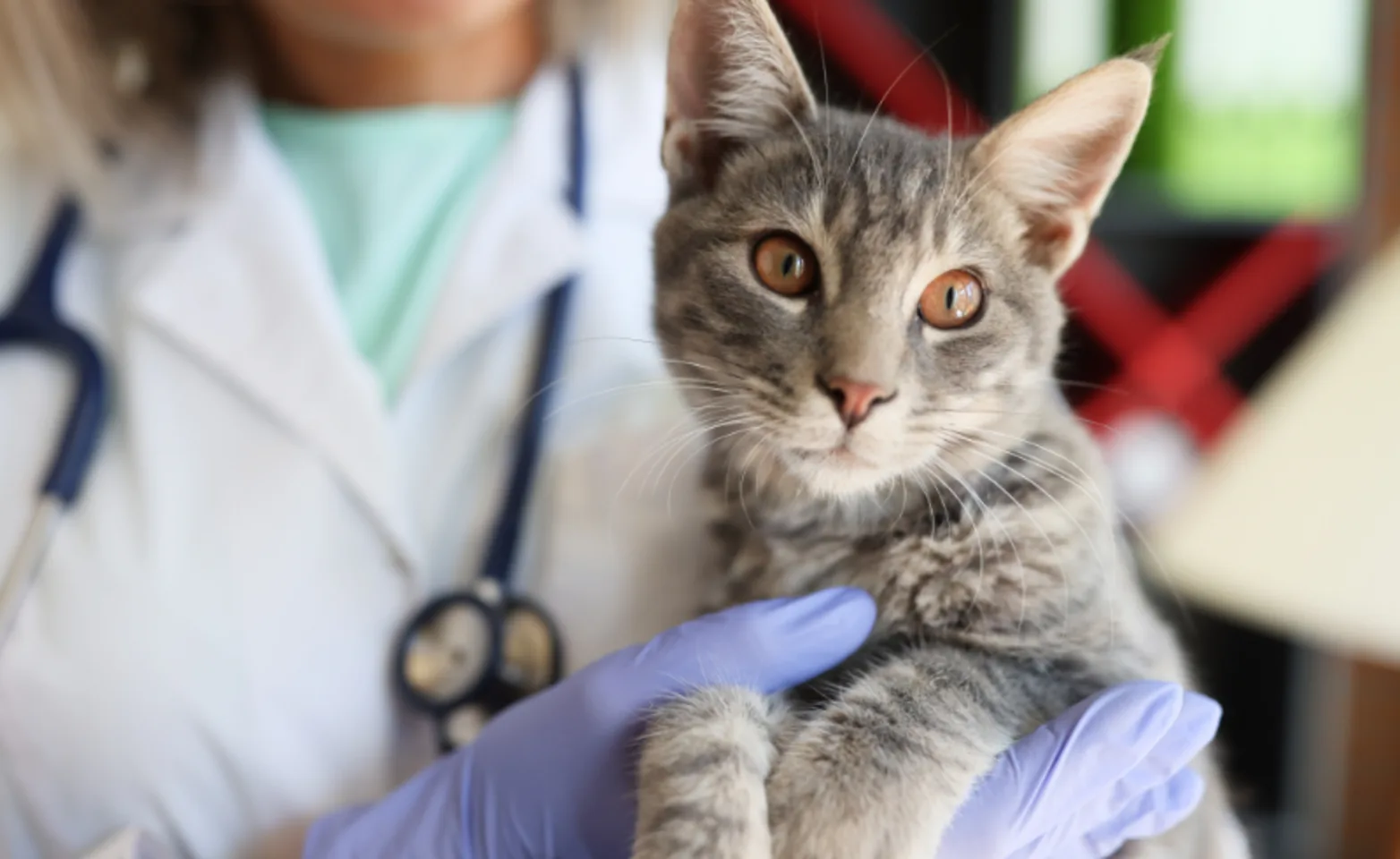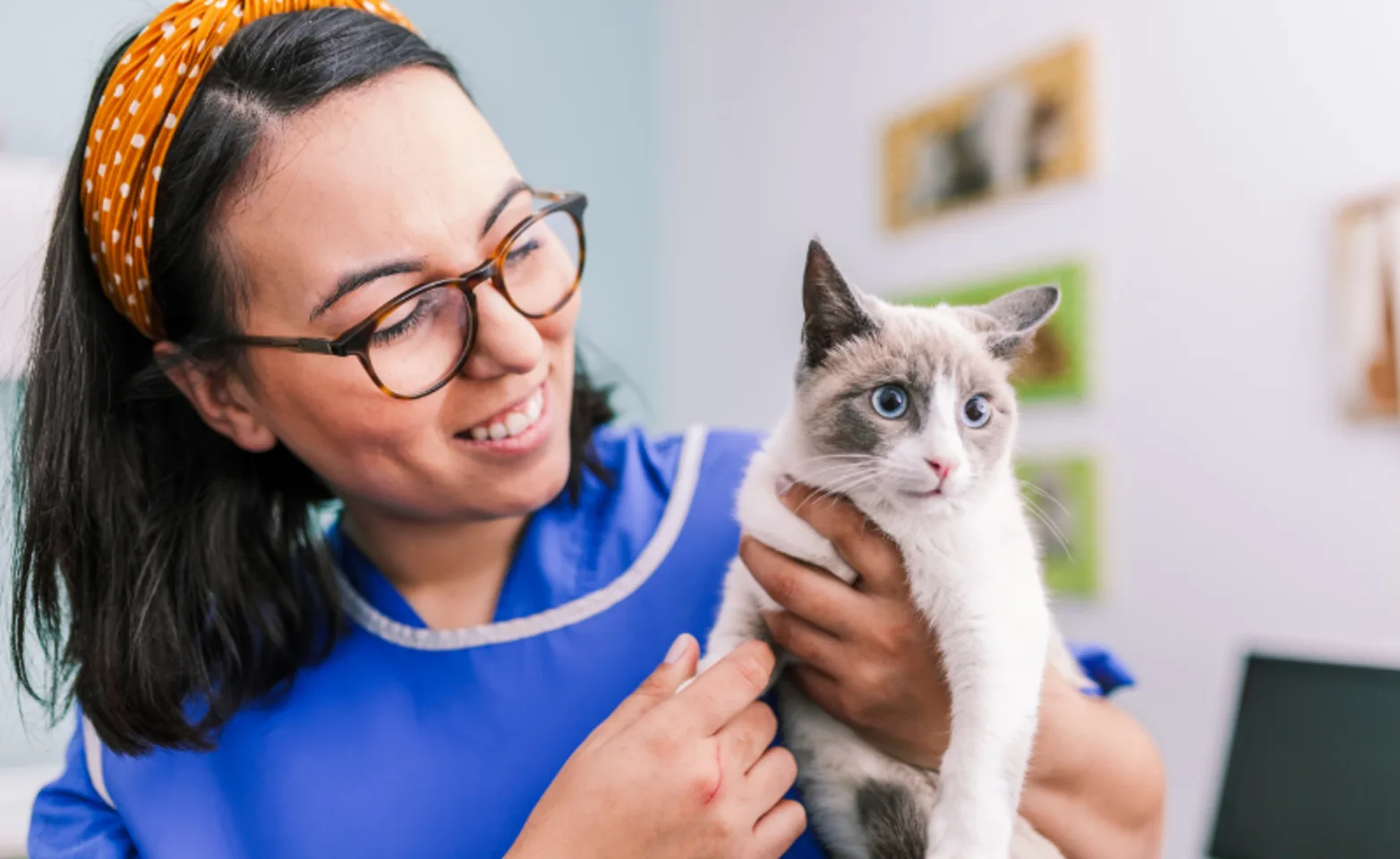Alaska Veterinary Clinic

At Alaska Veterinary Clinic, we are proud to be the only veterinary facility in Alaska currently offering radioiodine treatment (I-131) —the gold standard treatment for feline hyperthyroidism.
This safe, non-invasive, and highly effective therapy provides a permanent solution to one of the most common endocrine conditions affecting older cats. With a success rate of over 95%, radioiodine treatment (I-131) targets and eliminates overactive thyroid tissue while leaving healthy tissue unharmed—typically with just a single injection.
Our dedicated veterinary team includes a doctor and licensed technicians who have undergone extensive training in administering radioactive iodine. We are committed to providing the highest level of care, safety, and support throughout your cat’s treatment journey.
Feline patients stay in a quiet, dedicated treatment room designed with their comfort in mind. Each cat enjoys a spacious cat condo with soft, plush blankets and access to cat-specific entertainment on a television designed to keep them relaxed and engaged. We’ve created a cozy, enriched environment tailored specifically for cats. Most importantly, we love cats—and it shows in everything we do. Our cat-loving team is committed to making every patient’s experience as calm and stress-free as possible.
Is My Cat a Candidate for Radioiodine Treatment (I-131)?
Most cats with hyperthyroidism are excellent candidates for I-131 treatment. Before proceeding, we may recommend additional testing if your cat has other health concerns—such as kidney disease, heart conditions, or other complicating factors—to ensure this is the safest and most effective option for them.
Disclaimer: Scheduling options may vary based on location of patient. Our team needs to be able to safely handle our patients, we may not be able to treat aggressive and/or fractious cats. Please note that staff is onsite from 7am-6pm, Monday through Friday. We do not have overnight staff.
What is Hyperthyroidism in cats?
Hyperthyroidism is a common condition in older cats caused by an overactive thyroid gland, which produces too much thyroid hormone. This speeds up your cat’s metabolism and can lead to symptoms like weight loss (despite a good appetite), increased thirst, restlessness, vomiting, and a rough or greasy coat. If left untreated, it can affect the heart, kidneys, and overall quality of life—but thankfully, it’s very treatable.
What is Radioiodine Treatment (I-131)?
I-131, or radioiodine treatment, is a safe and effective treatment for cats with hyperthyroidism. It involves a single injection of radioactive iodine, which is absorbed by the overactive thyroid tissue and destroys it—without harming the healthy parts of the thyroid or other organs. Most cats only need one treatment, and it often cures the condition permanently. It’s a non-invasive alternative to daily medications or surgery, with minimal stress for your cat.

Benefits of Radioiodine Treatment
Radioiodine treatment (I-131) is the most effective and stress-free way to treat feline hyperthyroidism—and it comes with many benefits:
Curative in most cases – One injection is often all it takes to permanently treat the condition.
No anesthesia or surgery required – It's a non-invasive treatment that keeps your cat comfortable.
No daily medication or special diets – No more struggling with pills or changing your cat’s food.
Targets only abnormal thyroid tissue – Healthy tissue is left untouched.
Minimal side effects – Most cats recover quickly with little to no discomfort.
Long-term cost savings – A one-time treatment can eliminate the need for lifelong medications and frequent vet visits.
Radioiodine treatment helps your cat feel better, live longer, and enjoy a healthier life—with less stress for both you and your cat.
Why Choose Alaska Veterinary Clinic for Radioiodine Treatment?
Licensed I-131 Treatment Facility – Approved and equipped to safely administer radioactive iodine therapy.
Feline-Friendly, Compassionate Care – Our team is dedicated to making your cat’s experience as comfortable and stress-free as possible.
Personalized Treatment Plans – We tailor each case to your cat’s individual needs and health history.
Experienced Veterinary Team – Our veterinarian and licensed technicians have advanced training in I-131 therapy and feline care.
Safe, Dedicated Radiation Ward – Specially designed to ensure safety, comfort, and compliance with all regulatory standards.
What to Expect:
Referral Process: Please have your regular Veterinarian fill out our referral form and attach all records from your cat’s most recent visit up to 1 year prior to diagnosis. After we have reviewed the records, we will reach out to you to schedule the Pre-Radioiodine Exam with Dr. Lindquist.
Pre-Radioiodine Exam and Diagnostics: 60 Minute Pre-Radioiodine Exam with comprehensive lab work, blood pressure, 6-view radiographs with board certified radiologist review, sani-shave and nail trim.
Intake and Treatment – Monday Morning: Scheduled intake time with a Licensed Veterinary Technician, radioiodine injection, and relaxation for the next 4 days in our radioactive iodine suite.
Post-Treatment Discharge – Friday Afternoon: Scheduled go home time with a Licensed Veterinary Technician.
1, 3, and 6 Months Post-Radioiodine Treatment Exams and Diagnostics: 30 minute Post-Radioiodine Treatment Exam, comprehensive lab work, and blood pressure.
Treatment Cost
Please be aware that the total cost of this advanced medical procedure entails more than the medication and hospital stay. Radioiodine treatment involves several appointments, both before and after your cat’s treatment.
Pre-Radioiodine Exam and Diagnostics $1,782
Includes the following:
60 Minute Pre-Radioiodine Exam with Dr. Kellie Lindquist
Comprehensive lab work – includes CBC, chemistry panel, Cardiopet proBNP, Total T4, feline TSH, feline Free T4, and urinalysis with ultrasound guided cystocentesis.
Blood pressure
6-View Radiographs with Board Certified Radiologist Review
Sani-shave and nail trim
Misc. Medications – Gabapentin, Visbiome Probiotic, Revolution, and Mirtazapine and Cerenia as needed.
Radioiodine Treatment $2,700
(Misc. Medications are an additional cost)
Includes the following:
Scheduled intake time with Licensed Veterinary Technician
Radioiodine Injection
4 Day Hospitalization
Misc. Medications – Mirtazapine and Cerenia as needed, and Visbiome probiotic daily.
Post Treatment Exams
1 Month Post-Treatment Exam
3 Months Post-Treatment Exam
6 Months Post-Treatment Exam
$878 per Post-Treatment Visit
Includes the following:
30 Minute Post-Radioiodine Treatment Exam with Dr. Kellie Lindquist
Comprehensive lab work – includes CBC, chemistry panel, Cardiopet proBNP, Total T4, feline TSH, feline Free T4, and urinalysis with ultrasound guided cystocentesis.
Blood pressure
What is radioiodine treatment (I-131), and how does it work?
Radioiodine treatment (I-131) is a simple and effective option for treating hyperthyroidism in cats. Your cat will be given an injection of radioactive iodine (I-131) under the skin, which is absorbed into its system. The iodine travels directly to the thyroid gland, where it targets and destroys the overactive, abnormal thyroid tissue. The radioactive iodine focuses on the abnormal tissue, leaving the normal thyroid tissue unharmed. Since the thyroid gland uses iodine to produce hormones, it’s the only part of your cat’s body that is affected by the treatment. This makes it a safe and precise way to treat hyperthyroidism.
Why radioiodine treatment (I-131) is considered the gold standard for treating hyperthyroidism?
Radioactive iodine (I-131) is a simple, safe, and effective way to treat hyperthyroidism without the hassle of daily medications, their side effects, or the need for an iodine-restricted diet. It also eliminates the risks that come with surgery and anesthesia.
This treatment can cure hyperthyroidism in most cats! Within just 4 weeks, 80% of cats have normal thyroid hormone levels, and by 6 months, 95% are back to normal. It’s a great long-term solution to help your cat feel better without the ongoing need for medication.
Will my cat's hyperthyroidism be resolved with radioiodine treatment (I-131)?
Most hyperthyroid cats are successfully cured with a single radioiodine treatment (I-131). However, in approximately 5% of cases, a second treatment may be necessary if the thyroid tissue is particularly resistant.
Our approach is to target and eliminate the abnormal thyroid tissue while preserving as much healthy tissue as possible. This helps minimize the likelihood of requiring lifelong thyroid hormone supplementation.
It’s important to note that a small percentage of cats (3–5%) may still experience reduced thyroid function following treatment—especially those with more advanced or long-standing disease. In such cases, daily hormone supplementation may be needed and is generally a well-tolerated adjustment after successful treatment of hyperthyroidism.
How do I schedule my cat for an exam and treatment?
Please have your cat’s regular veterinarian fill out our referral form which is located on our website.
Your cats referring veterinarian must email all records from your cat’s most recent visit up to 1 year prior to diagnosis. After we have reviewed the records, we will reach out to you to schedule the Pre-Radioiodine Exam with Dr. Lindquist. When we reach out, we will take a deposit for the Pre-Radioiodine Exam, and schedule both the treatment and 1 month post treatment exam.
How long will my cat be in the hospital?
Once admitted for treatment, your cat cannot be legally or safely discharged for 4 days. Intakes are Monday mornings and your cat will be discharged Friday before 2pm.
What is the cost of radioiodine treatment (I-131)?
Radioiodine treatment involves several appointments both before and after your cat’s treatment. If it’s difficult for you to accommodate these visits, this option may not be the best fit for your cat’s care at this time.
Pre-Radioiodine Exam and Diagnostics $1,782
Includes the following:
60 Minute Pre-Radioiodine Exam with Dr. Kellie Lindquist
Comprehensive lab work – includes CBC, chemistry panel, Cardiopet proBNP, Total T4, feline TSH, feline Free T4, and urinalysis with ultrasound guided cystocentesis.
Blood pressure
6-View Radiographs with Board Certified Radiologist Review
Sani-shave and nail
Misc. Medications may include – Gabapentin, Visbiome Probiotic, Revolution, and Mirtazapine and Cerenia as needed.
Radioiodine Treatment (I-131) $2,700 (Misc. Medication are an additional cost)
Includes the following:
Scheduled intake time with Licensed Veterinary Technician
Radioiodine Injection
4 Day Hospitalization
Misc. Medications – Mirtazapine and Cerenia as needed, and Visbiome probiotic daily
1 Month Post-Treatment Exam, 3 Months Post-Treatment Exam, and 6 Months Post-Treatment approximately $878 per visit
Includes the following:
30 Minute Post-Radioiodine Treatment Exam with Dr. Kellie Lindquist
Comprehensive lab work – includes CBC, chemistry panel, Cardiopet proBNP, Total T4, feline TSH, feline Free T4, and urinalysis with ultrasound guided cystocentesis.
Blood pressure
While we strive to keep all pricing information accurate, we cannot guarantee that the prices listed will remain unchanged. Prices are subject to change without notice. Please contact us directly for the most current pricing.
My cat does not do well away from home. What do you do to keep cats comfortable?
Your cat will stay in a dedicated, feline-only area designed specifically for their comfort and care. Since no dogs are allowed in this space, your cat won’t encounter the sights or scents of dogs, helping to reduce stress during their stay.
Your cat is in the care of doctors and licensed technicians who are experienced and trained to support cats during times of stress.
The radioiodine treatment room is away from the main treatment area making this location in the hospital quieter.
We can also use Feliway, a feline pheromone, which has a calming affect for most cats
Fresh food and water are available at all times. Please inform us of any likes or dislikes or special dietary needs that your cat may have, so we can make their stay as comfortable as possible
We also offer safe anti-anxiety medications for your cat daily if needed.
May I visit my cat while in the hospital?
We're sorry, but state and federal regulations prohibit owners from entering the radiation area for safety reasons. Rest assured, your cat is in good hands with our experienced, caring team.
May I bring my cat’s favorite toys or bedding?
We kindly discourage you from bringing toys or blankets from home, as they will be exposed to radioactive material and will need to be disposed of. If you prefer to bring familiar items for your cat’s comfort, please understand that they cannot be returned after the stay.
What care does my cat receive while they are in the radioactive iodine suite?
In our radioactive iodine suite, your cat will be cared for by a dedicated, highly trained licensed technicians, under the supervision of a veterinarian. Every day, your cat will receive fresh food, water, and clean litter, along with close monitoring. To help keep your cat relaxed and engaged, a TV will play cat-friendly programming designed to entertain and comfort feline guests. Your cat's safety, well-being, and comfort are our top priorities throughout the treatment process.
How will I find out about my cat's condition during hospitalization?
We will send you daily text updates during your cat’s hospitalization to keep you informed on how they’re doing. Of course, if any concerns arise, we will contact you right away.
Do I need to stop the antithyroid medications (Methimazole/Felimazole) prior to treatment?
Yes. They should be discontinued approximately 2 weeks before treatment. If your cat is fed y/d food for treatment, that should be stopped at least 37 days before scheduled exam.
When my cat is ready to come home, what do I have to do?
At your cat’s initial exam with the doctor and technician, we’ll go over detailed instructions on caring for your cat and explain the important precautions to follow once they’re discharged from the hospital.
I have other pets in my home. Is it safe for them to interact and sleep with my cat?
There is no risk to your other pets. After returning home, your cat can safely share litter boxes, play, and sleep with your other pets as usual. The only precaution is to be mindful of any litter that may be tracked out of the litter box — it should be promptly vacuumed, collected, and stored appropriately before disposal.
What Precautions Do I Need To Take After Treatment?
For 7 days upon returning home, following these guidelines is advised to decrease your lifetime exposure to radiation.
Keep your cat indoors. The concern is that a roaming cat will come in contact with other people.
We advise close contact (closer than 3 feet) should be limited to 30 minutes per day. The dose you are exposed to is extremely low.
There is no risk for other pets. Your cat can share the litter box with other cats, can play, and sleep with other pets as usual.
For this 7 day period the cats waste must be scooped daily and stored for 80 days.
Wash your hands carefully after handling your cat; litter pan and food dishes.
Do not allow children or pregnant women to have contact with your cat for 14 days.
We advise you against sleeping with your cat for 7 days.
These precautions seem like my cat is hazardous to me. How safe is it?
The amount of radiation remaining in your cat is extremely low. A hyperthyroid person having radioiodine treatment typically receives up to up ten times the dose your cat will receive, goes home the same day treatment was given, and contact restrictions are limited to a day or two. The amount of radiation you might receive from exposure to your cat after they have been treated would be equivalent to the radiation received when you fly (atmospheric radiation) round trip across the country.
